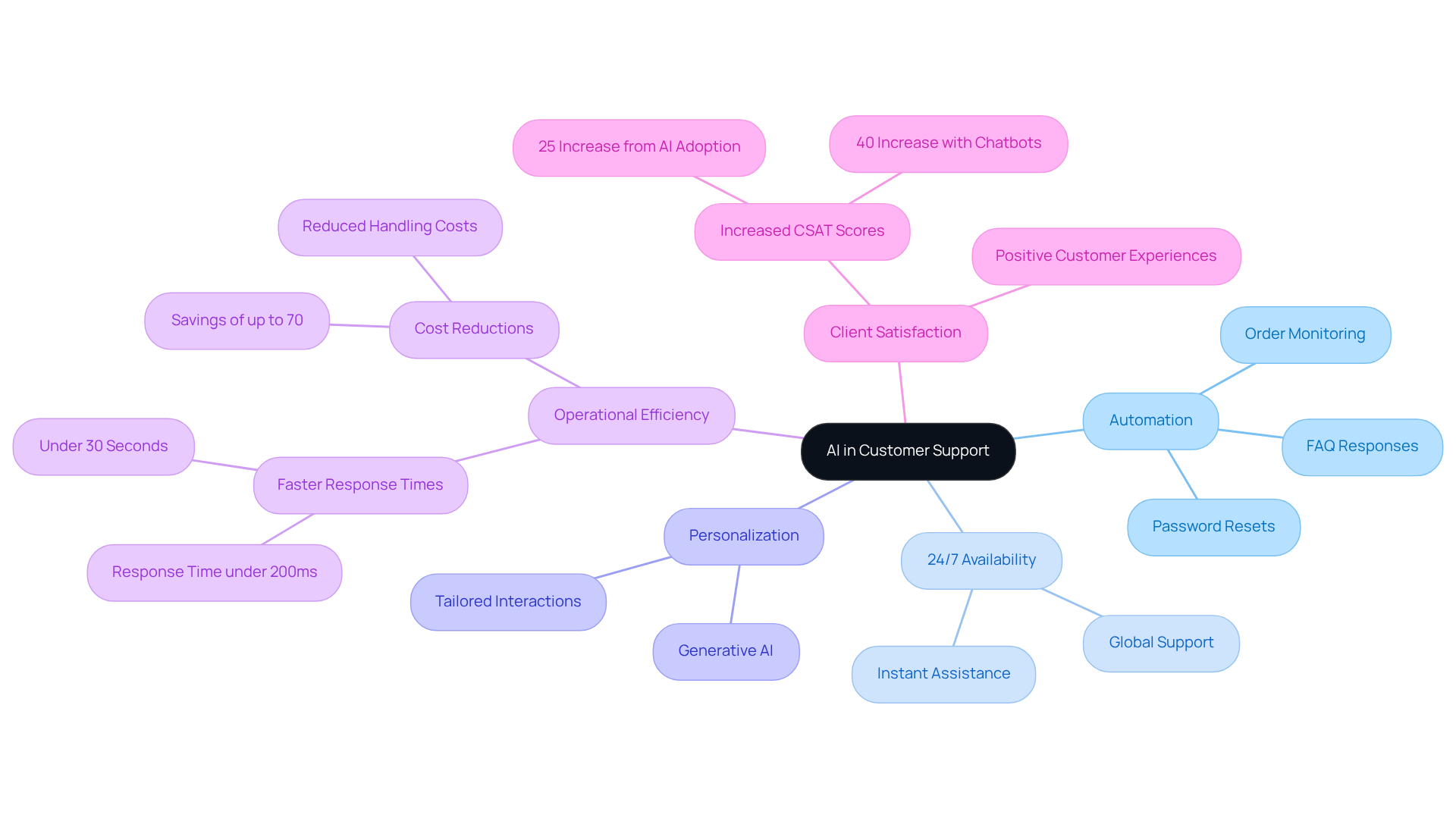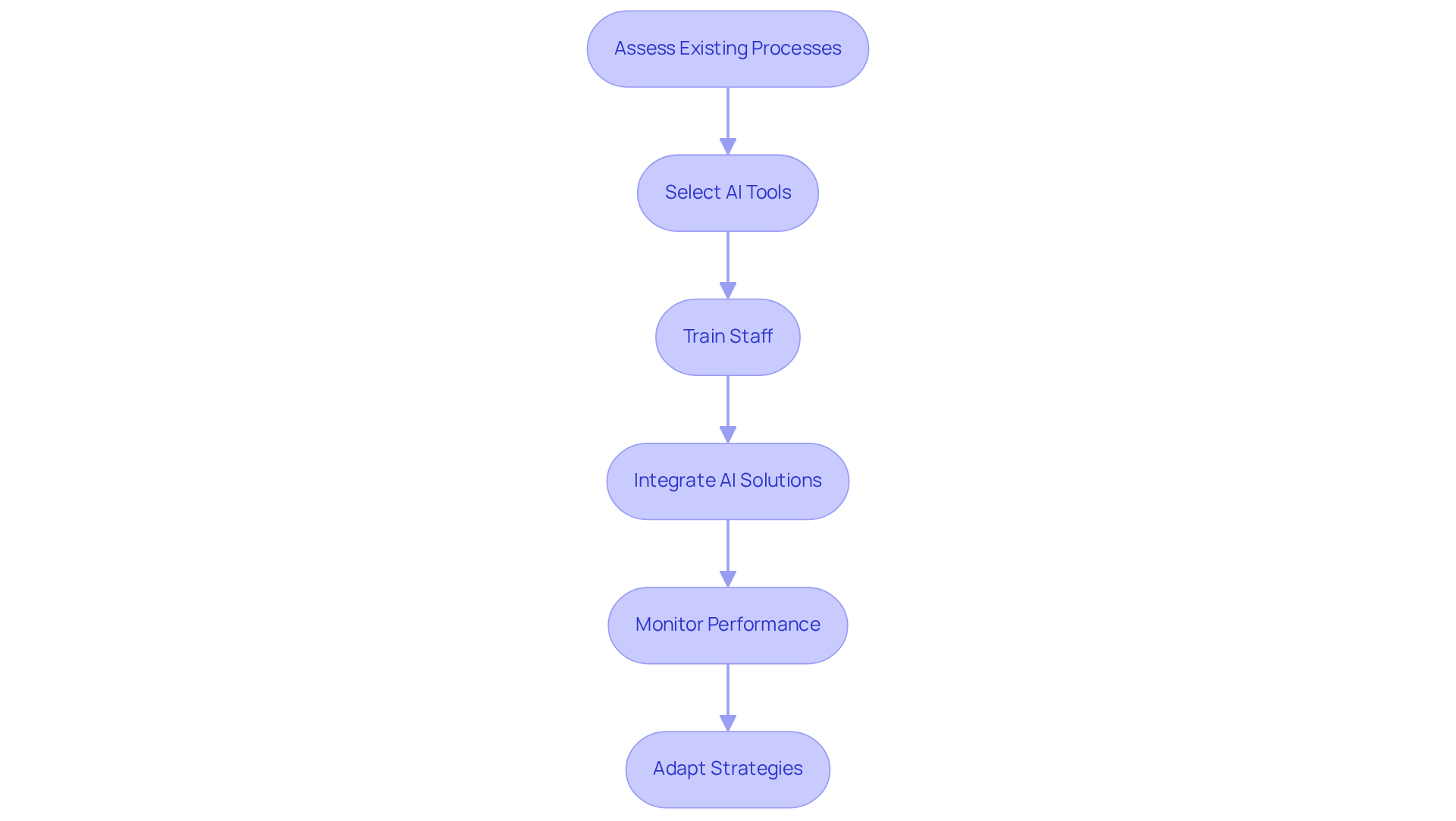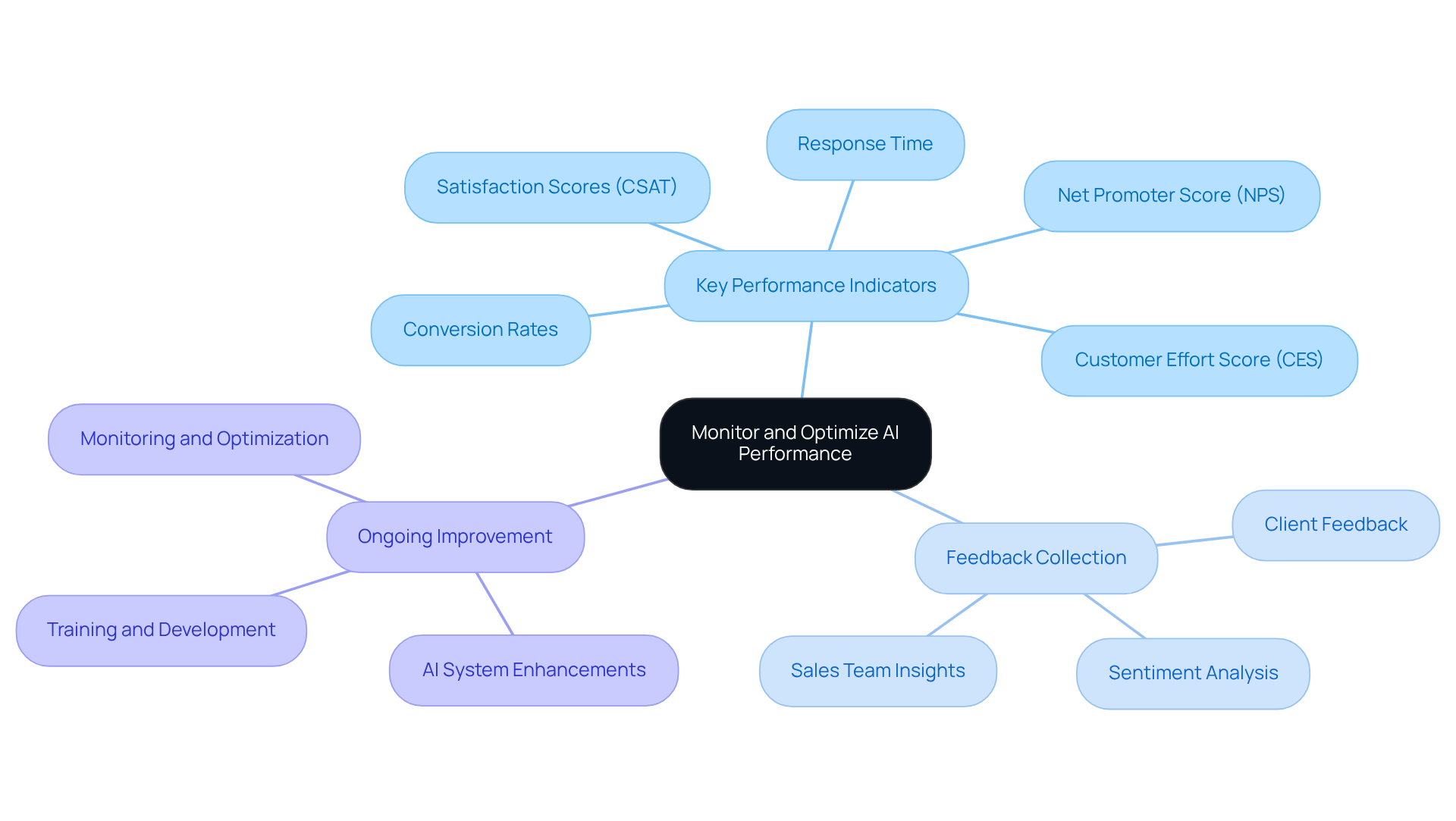Overview
To boost sales through AI customer support, managers must prioritize the integration of AI tools that automate routine tasks, enhance customer interactions, and personalize sales processes.
Businesses leveraging AI report significant improvements in customer satisfaction and conversion rates, showcasing the effectiveness of AI in driving operational efficiency and revenue growth.
By adopting these strategies, organizations can not only streamline their operations but also foster stronger customer relationships, ultimately leading to increased sales and market competitiveness.
Introduction
The integration of artificial intelligence into customer support is not merely a trend; it is fundamentally reshaping the landscape of business operations. By automating routine tasks and providing personalized interactions, AI solutions significantly enhance customer satisfaction and operational efficiency.
However, organizations striving to harness these technologies face the critical challenge of effectively implementing and optimizing AI systems to drive sales performance.
How can managers ensure that their AI strategies not only improve customer service but also translate into tangible sales growth?
Understand the Role of AI in Customer Support
AI customer support is revolutionizing the way businesses handle customer inquiries by automating routine tasks, ensuring 24/7 availability, and personalizing interactions. Sophisticated AI systems, such as customizable voice assistants, effectively manage inquiries, direct requests, and provide , significantly minimizing wait times.
For instance, AI agents promptly respond to FAQs, monitor orders, and reset passwords, allowing human agents to focus on more intricate matters. This transformation not only improves operational efficiency but also enhances client satisfaction by delivering timely assistance.
Entities utilizing AI customer support solutions from this provider report substantial enhancements in client satisfaction and cost reductions in support operations, with many achieving savings of up to 70%. The success story of GCS exemplifies this trend, as they improved their revenue efficiency with Intone's AI voice agents, attaining remarkable outcomes without the need for setup or tuning.
As AI technology continues to progress, particularly with the application of generative AI for enhanced personalization, its significance in AI customer support will only grow, making it imperative for businesses to adopt these solutions to remain competitive.

Leverage AI to Drive Sales Performance
To enhance revenue performance, managers must prioritize the integration of AI tools that refine lead qualification, automate follow-ups, and personalize client interactions. The versatile AI voice representatives exemplify this by delivering human-like interactions capable of successfully closing deals. These representatives analyze client data to identify high-intent prospects, enabling sales teams to concentrate their efforts effectively.
For instance, the intelligent analytics dashboard delivers real-time insights into customer behavior, empowering representatives to tailor their pitches accordingly. Moreover, automating follow-up communications through the AI system ensures timely reminders for payments or product offerings, significantly boosting conversion rates.
Businesses that have adopted AI from the company in their operations report up to 1.5 times more conversions compared to traditional methods, underscoring AI's potential to drive success. With features such as and continuous performance improvement through real-time feedback, Intone's solutions are designed to enhance efficiency and client engagement within the finance sector.

Implement AI Solutions Effectively in Sales Operations
To implement AI solutions effectively, managers must first assess their existing processes to pinpoint areas where AI can deliver significant value. This assessment should encompass the selection of AI tools that align with business objectives, ensuring seamless integration with current systems. Training staff on these tools is vital for unlocking their full potential.
For example, the integration of AI customer support voice agents into support operations can substantially enhance efficiency and elevate customer interactions. Continuous monitoring and the establishment of feedback loops are essential for refining AI performance and adapting strategies as necessary.
Statistics indicate that by 2025, , and firms that successfully incorporate AI into their processes can expect up to a 20% increase in productivity and a 15% boost in revenue growth. Organizations like Intone exemplify how a systematic approach to AI deployment can lead to substantial improvements in revenue efficiency and client engagement.

Monitor and Optimize AI Performance for Sustained Success
To achieve sustained success with AI customer support and sales, managers must establish (KPIs) that effectively assess the performance of AI tools. Key metrics such as response time, satisfaction scores (CSAT), and conversion rates should be consistently examined to evaluate AI effectiveness. Notably, 31% of service leaders prioritize client satisfaction and retention as top KPIs, underscoring the significance of these metrics in assessing AI's impact.
Moreover, collecting feedback from both clients and sales teams yields valuable insights into areas that require enhancement. Ongoing improvement of AI systems, informed by these metrics, is essential for organizations to adapt to evolving client needs and market conditions.
Companies that prioritize monitoring and optimization, exemplified by Intone, can achieve long-term success and maintain a competitive edge in their industries. By leveraging AI tools capable of autonomously handling up to 70% of customer inquiries, businesses can streamline operations while enhancing customer engagement, ultimately driving better sales outcomes.

Conclusion
AI customer support is revolutionizing the realm of customer interactions and sales performance, offering businesses a distinct opportunity to boost efficiency and satisfaction. By automating routine tasks and personalizing engagements, AI not only streamlines operations but also allows teams to concentrate on more complex issues. This, in turn, leads to enhanced client experiences and increased revenue potential.
The article outlines several key strategies for effectively leveraging AI in customer support and sales:
- Understanding the role of AI in automating inquiries and enhancing lead qualification.
- Implementing robust performance monitoring systems.
These are essential best practices for organizations aiming to fully capitalize on AI technologies. Furthermore, success stories from companies utilizing AI solutions illustrate the tangible improvements in client satisfaction and conversion rates that can be realized.
As businesses navigate the shifting digital landscape, embracing AI is not merely advantageous but essential for sustained growth. By prioritizing the integration of AI tools, continuously optimizing their performance, and focusing on customer-centric metrics, organizations can secure a competitive edge. The future of customer support and sales resides in the intelligent application of AI, making it imperative for managers to adopt these practices to flourish in an increasingly automated world.
Frequently Asked Questions
What is the role of AI in customer support?
AI in customer support automates routine tasks, ensures 24/7 availability, and personalizes interactions, revolutionizing how businesses handle customer inquiries.
How do AI systems improve customer support?
AI systems, such as customizable voice assistants, manage inquiries, direct requests, and provide immediate responses, significantly reducing wait times for customers.
What types of tasks can AI agents perform?
AI agents can promptly respond to FAQs, monitor orders, and reset passwords, allowing human agents to focus on more complex issues.
What benefits do businesses experience by using AI customer support?
Businesses report enhanced client satisfaction, improved operational efficiency, and cost reductions in support operations, with some achieving savings of up to 70%.
Can you provide an example of a business that benefited from AI customer support?
GCS is an example of a business that improved its revenue efficiency with Intone's AI voice agents, achieving remarkable outcomes without the need for setup or tuning.
How is generative AI influencing customer support?
As AI technology progresses, particularly with generative AI, its ability to enhance personalization in customer support is growing, making it essential for businesses to adopt these solutions to remain competitive.






